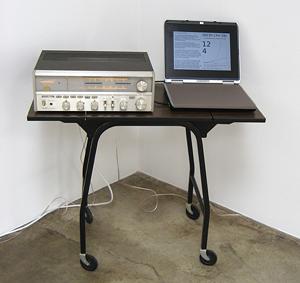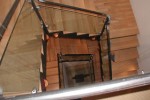Paul Slocum is an artist and musician from Texas who combines art and digital culture with a supremely punk attitude.
His newest work is on display at Dunn and Brown Contemporary in Dallas and is made up of a vintage (euphemism for “garage sale”) amplifier hooked up to a laptop running software of his own creation.
This software is called the “Pi House Generator”, and randomly generates house music using the number PI. Much like the number itself, the music stream never repeats and constantly continues to evolve.
The software progressively calculates the sequence of digits in pi, starting at 3.14 and progressing towards infinity. As the program calculates the digits, it feeds the results into an algorithmic music generator containing my structural criteria for house music. The resulting piece of house music is infinitely long and static and never repeats itself.
The number of processor cycles required to calculate pi increase with the number of digits it is calculated to. After months or years of playing the song, any fixed computer hardware will be unable to calculate the digits fast enough for the song to play continuously.
The rate that the number of processor cycles increase per pi-digits is bound by the formula Z*log(N); however based on Moore’s Law, processor power per dollar increases at an exponential rate – doubling every two years. BY upgrading computers regularly with market trends, the song can be played indefinitely. – Paul
You can listen to a sample of the stream right here.
[audio:http://www.noiseaddicts.com/wp-content/uploads/2008/09/pi-music.mp3]
 There is something inherently beautiful about combining mathematics with music, especially when the result doesn’t sound like it is actually a product of math – too many pop songs fall into this category! Because I’m both a math freak AND a music freak, I spoke with Paul a little bit more about how the software works, and he told me:
There is something inherently beautiful about combining mathematics with music, especially when the result doesn’t sound like it is actually a product of math – too many pop songs fall into this category! Because I’m both a math freak AND a music freak, I spoke with Paul a little bit more about how the software works, and he told me:
New pi digits are calculated every minute or so, and they are used to choose sample points, sample arrangement, drum samples, and drum patterns. I also use the pi digits to seed a pseudo-random number generator so that I can generate as many random numbers as I need from a pi digit set. Also, some elements are cyclic, like the samples sets used and general arrangement limitations.
There is also a one hour long clip here (sorry this link has been taken down to bandwidt usage – Contact us if you’d like the file. It’s long, but has some truly great sections in there.
If you want to geek out about PI, go see Paul Slocum – artist and musician .
**Update** – Paul may be making his software available for download soon – we are also likely going to be setting up a real time stream of the music.






First of all, haters/critics be damned. This is an awesome idea. Thanks for sharing it, Paul!
I would like a link to the hour long track please
I vote this reply.
Could I get a link to the full track please.
I was wondering if I can get a copy of the hour long track? The sample whet my appetite.
Cheers
Darren
very clever,
may I listen to the track? thanks,
i would love to listen to the full hour track too. thanks!
I put the long sample back on my site. The pi digits are used to select drums and choose where they are placed, the sample selection and placement, and a few other things like ‘fills’. The choice of sample sets is cyclical and changes every couple of minutes. The drum samples are standard drum samples stored in a WAV file. The other samples are mostly contemporary Christian music which I’ve found is good for sampling. There are also some basic synth samples and a few other things that it pulls from. The source sample data is about 1 gig uncompressed.
I would like a link to the hour long track please
I also would like the hour long version. Please contact.
That was awesome i cant believe Pi was behind that. sign me up for the long version please, is it on a torrent?
I’d love to hear the 1 hr track. Possible to send link?
With thanks,
Elahn
Who do I contact to get the long version?
You can just upload the hour long sample to mediafire or megaupload and give the link.
hi, i’m wondering if there are alternate links to get the hour long sample? heard the hour long music yesterday, and yeah, it was pretty cool 😀
This is so cool! Being a music aficionado and a geek I really love the idea. Please release this for Linux even if it has to be closed source. Thanks!
now use the number e…. maybe you’ll get some other awesome dance beats?
Music is maths in every way, that much is true…
As a professional musician, I have always argued that producing conventional house music (other types of electronic music are usually more advanced) requires no musical talent all at, only a knowledge of production software, this new technology simply reiterates that fact.
If you’d ever tried to create house music yourself you’d know how wrong you are. Just another classic example of “I don’t like it so it must be bad!”.
i liked the music. but, my inclination is to say SO WHAT? about the method used to create it. this is a form of serialism – a simplistic version of it, in fact. pi (as far as we know) has an infinite # of decimal places. but based on what the creator of this music has said re: how the numbers are used, the bottom line is since there are 10 possible digits (0-9) the music has potentially 10 different states. beyond this, it’s all about how the composer links the data to musical parameters based on musical / aesthetic choices, not math. these choices are totally subjective & have nothing to do, really, with the digits of Ï€… sorry. you could say you were using this data set & make ANY KIND OF MUSIC YOU WANTED TO as evidenced by this example: you’ve made 4-on-the-floor house music. how incredibly uninteresting.
Damn, they should implement true random generators on every motherboard coming out of the factories. A simple resistor can be a nice quantum noise source. Better than any algorithm. Also it can just generate the seed for a classical algorithm.
My brother and I have been playing with PI for years, and he (Ed Blanchfield) even went on to put PI to music with MIDI drums – a must read:
Enjoy, Dez
—
dez blanchfield
FYI. Random numbers are normally generated from an algorithm that takes the computer’s system clock as the input.
Beautiful concept…
…Horrible, horrible, sorry excuse for music. Even as a lover of electronica and trance, it pained me to listen to that garbage.
pi is not the sequence of its digits, it’s a higer concept, it is all the digits (infinity) at the same time.
For real random numbers, just sample white noise, that will request less computer power and worck forever.
you do not need to compute pi, someone has already done it with zillions of digit. your pi will be exactly the same ! so store it in a file.
btw, i would like to hear e, does it sound different ?
Very beautiful.
To Gene: a computer can’t actually generate truly random numbers, because its totally deterministic. So, what you do is pick one single number and then an elaborate algorithm generates numbers that are in a sense random, but anytime you give the number generator the same seed it produces the same string of digits. Thus, pseudo-random.
http://en.wikipedia.org/wiki/Pseudorandom_number_generator
Nice idea. Are there 11 notes altogether? From 0->9 and a decimal.
Uses a pseudo-random number generator to generate as many RANDOM numbers as I need…
Err…?
Wow, that is absolutely amazing. very cool.
Jiff